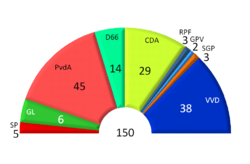- Dutch general election, 1998
-
Dutch general election, 1998 
1994 ← May 6, 1998 → 2002 All 150 seats to the House of Representatives
76 seats were needed for a majorityFirst party Second party Third party 
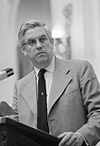
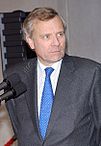
Leader Wim Kok Frits Bolkestein Jaap de Hoop Scheffer Party PvdA VVD CDA Leader since 1986 1990 1997 Last election 37 seats, 23,9% 31 seats, 19,9% 34 seats, 22,2% Seats won 45 38 29 Seat change +8 +7 -5 Popular vote 2.494.555 2.124.971 1.581.053 Percentage 29,0% 24,7% 18,3% Fourth party Fifth party Sixth party 


Leader Els Borst Paul Rosenmöller Jan Marijnissen Party D66 GL SP Leader since 1998 1994 1988 Last election 24 seats, 15,4% 5 seats, 3,4% 2 seats, 1,3% Seats won 14 11 5 Seat change -10 +6 +3 Popular vote 773.497 625.968 303.703 Percentage 9,0% 7,3% 3,5% Seventh party Eighth party Ninth party 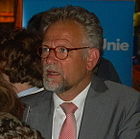
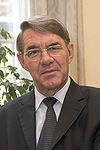
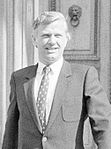
Leader Leen van Dijke Bas van der Vlies Gert Schutte Party RPF SGP GPV Leader since 1994 1986 1981 Last election 3 seats, 1,7% 2 seats, 1,7% 2 seats, 1,3% Seats won 3 3 2 Seat change 0 +1 0 Popular vote 174,593 153,583 108,724 Percentage 2,0% 1,7% 1,2%
Seats
Prime Minister before election
Prime Minister
The General Election to the House of Representatives of the States-General of the Netherlands was held in the Netherlands on 6 May 1998.
Contents
Result
During the 1998 election the purple coalition, with social-democrats, democrats and liberals fortified its majority. Both the social-democratic PvdA and the conservative liberal VVD won considerably, much at the cost of their junior partner in cabinet, the progressive liberal D66.
Political observers attributed the win to the economic performance of the coalition, including reduction of unemployment and the budget deficit, steady growth and job creation combined with wage freezes and trimming of the welfare state, together with a policy of fiscal restraint.[1]
The two small left opposition parties, the green GroenLinks, and the socialist SP, were rewarded for their 'quality opposition'. The major opposition party, CDA, uncomfortable in its opposition role, also lost seats. The two parties for the elderly AOV and Unie 55+ and the rightwing populist CD did not return to parliament.
The formation resulted in the continuation of the Kok cabinet, with the second Kok cabinet.
National summary
Party Lijsttrekker Votes % Seats +/- Labour Party Wim Kok 2,494,555 28.9 45 + 8 People's Party for Freedom and Democracy Frits Bolkestein 2,124,971 24.6 38 + 7 Christian Democratic Appeal Jaap de Hoop Scheffer 1,581,053 18.3 29 - 5 Democrats 66 Els Borst 773,497 8.9 14 - 10 GreenLeft Paul Rosenmöller 625,968 7.2 11 + 6 Socialist Party Jan Marijnissen 303,703 3.5 5 + 3 Reformatory Political Federation Leen van Dijke 174,593 2.0 3 0 Reformed Political Party Bas van der Vlies 153,583 1.7 3 + 1 Reformed Political League Gert Schutte 108,724 1.2 2 0 Centre Democrats (Netherlands) Hans Janmaat 52,226 0.5 - -3 General Elderly Alliance/Union 55+ 45,994 0.5 - -7 Others 169,920 2.0 - 0 Total 8.607.787 100.0 150 0 References
- ^ IPU Parline - Netherlands, election held in 1998: http://www.ipu.org/parline-e/reports/arc/2231_98.htm.
External Resources
- NSD: European Election Database - Netherlands publishes regional level election data (NUTS 1-3); allows for comparisons of election results, 1994-2010
Netherlands 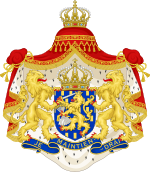
This article is part of the series:
Politics and government of
the NetherlandsConstitutionCabinetDecentralized gov'tForeign policyRelated subjects
 Elections and referendums in the Netherlands
Elections and referendums in the NetherlandsGeneral elections European elections Referendums Categories:- Elections in the Netherlands
- 1998 elections in Europe
- 1998 in the Netherlands
Wikimedia Foundation. 2010.

